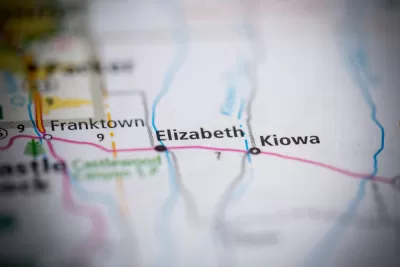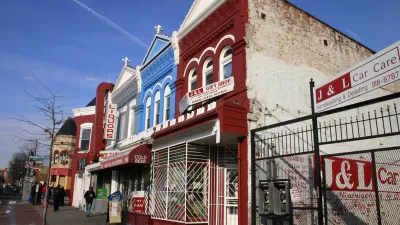A group of organizers in the small town of Elizabeth, Colorado (population 1,700) wants to recall its entire City Council as an act of defiance in the face of rapid change and growth.

"Forty miles from downtown Denver, where horse properties are plentiful and urban aggravations few, Elizabeth is starting to feel the city’s hot breath on its municipal neck," writes John Aguilar.
The Elbert County town of 1,700 "butts up against the eastern edge of fast-growing Douglas County" and doesn't want the development pressure changing the region, according to Aguilar. "So much so that they have launched an unprecedented effort to boot from office the town’s entire elected government."
Slow-growth advocates in Elizabeth don't have to look far to find an example of what might happen to the city if development interests are given free reign. The nearby city of Parker, just up State Highway 83, had 6,000 residents 30 years ago. Now Parker's population has reached 55,000. The recall effort is organizing under the slogan "We Are Not Parker."
As noted by Parker, the city's proposed comprehensive plan allows for substantial growth in the city's population. "The town’s comprehensive plan, which has been undergoing a contentious public review over the last few months, anticipates a buildout population in Elizabeth of 20,000 — a more than tenfold increase from today — over the next two decades."
According to Aguilar, the town is beset by population growth all over the Denver metropolitan area. Another 1 million residents are expected in the metropolitan area by 2050. In Douglas County, the population is expected to climb from 345,000 today to more than 442,000 by 2038.
FULL STORY: Growth concerns on metro Denver’s fringe spark effort to recall Elizabeth’s entire elected government

Maui's Vacation Rental Debate Turns Ugly
Verbal attacks, misinformation campaigns and fistfights plague a high-stakes debate to convert thousands of vacation rentals into long-term housing.

Planetizen Federal Action Tracker
A weekly monitor of how Trump’s orders and actions are impacting planners and planning in America.

In Urban Planning, AI Prompting Could be the New Design Thinking
Creativity has long been key to great urban design. What if we see AI as our new creative partner?

How Trump's HUD Budget Proposal Would Harm Homelessness Response
Experts say the change to the HUD budget would make it more difficult to identify people who are homeless and connect them with services, and to prevent homelessness.

The Vast Potential of the Right-of-Way
One writer argues that the space between two building faces is the most important element of the built environment.

Florida Seniors Face Rising Homelessness Risk
High housing costs are pushing more seniors, many of them on a fixed income, into homelessness.
Urban Design for Planners 1: Software Tools
This six-course series explores essential urban design concepts using open source software and equips planners with the tools they need to participate fully in the urban design process.
Planning for Universal Design
Learn the tools for implementing Universal Design in planning regulations.
Gallatin County Department of Planning & Community Development
Heyer Gruel & Associates PA
JM Goldson LLC
City of Camden Redevelopment Agency
City of Astoria
Transportation Research & Education Center (TREC) at Portland State University
Jefferson Parish Government
Camden Redevelopment Agency
City of Claremont





























